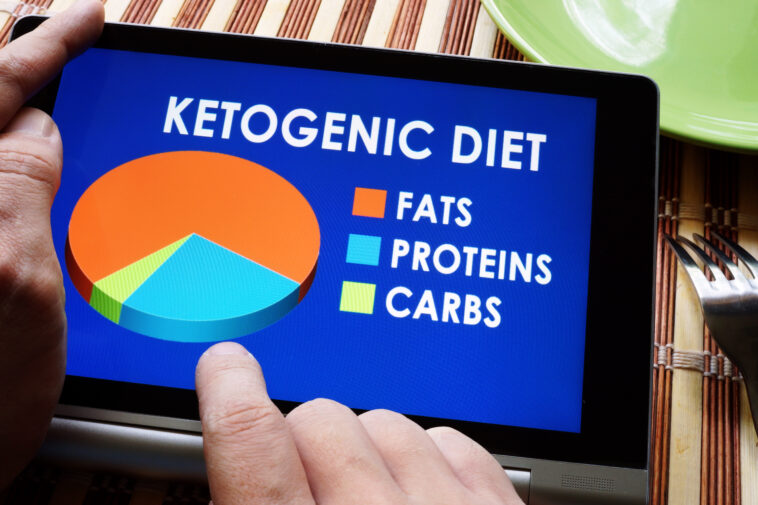Introduction
The keto diet is a high-fat, low-carbohydrate eating plan that has been gaining increasing popularity in the health and wellness industry. This way of eating has proven to be powerful in promoting fat loss and improving overall health, while providing numerous other benefits. In this article, we discuss the basics of the keto diet, its nutritional benefits, how to unlock the power of healthy fats, and how to make the transition to a keto lifestyle.
What is the Keto Diet – Explained
The keto diet is a diet that helps your body to switch from burning sugar (carbohydrates) for energy to burning fat for energy. By limiting the intake of carbohydrates to the suggested 5-10% of the diet, your body enters a state known as ‘ketosis’. This is where it begins to use the ketones it produces from burning stored fat for energy, rather than the glucose from carbohydrates. The remaining 90-95% of the diet should be made up of mostly healthy fats, with moderate amounts of protein.
The Basics
- Carbohydrates: Aim for 5-10% of daily calories.
- Proteins: Aim for 10-30% of daily calories.
- Fats: Aim for 70-85% of daily calories.
Foods to Eat
- Leafy greens
- Low-carb vegetables like broccoli and cauliflower
- Cheeses
- Healthy fats like avocado, olive oil, and coconut oil
- Nuts and seeds
- Moderate amounts of lean proteins like chicken and fish
- Certain dairy products like heavy cream and sour cream
Foods to Avoid
- Grains and refined sugars
- Beans and legumes
- Fruits
- Starchy vegetables
- Processed food and different sauces
- Alcohol
Identifying Nutritional Benefits of Keto Eating
The keto diet has been proven to have numerous health benefits. It can help to reduce inflammation, improve digestion, reduce the risk of chronic diseases, and improve overall mental health. Additionally, it has been shown to help with weight loss and aid in managing diabetes. Whatever your goal may be, the ketogenic diet is likely to help you reach it.
Weight Loss
Keto helps to reduce appetite and decreases overall cravings. It also boosts your metabolism and reduces water retention while encouraging the use of body fat for energy. This way of eating has been proven to be more effective than traditional low-calorie diets and can also help you to maintain a healthy weight.
Deer Reduction
Because of its anti-inflammatory effects, the keto diet can reduce pain and inflammation from joint or muscle disorders. Keto has also been known to improve energy levels, promote blood sugar control, reduce insulin sensitivity and improve overall blood pressure.
Brain Function
Ketones are a source of energy for the brain, and can improve mental clarity, focus, and mood. This way of eating also helps to reduce inflammation and oxidative stress, which can contribute to a range of mental health disorders. Furthermore, studies have shown that the ketogenic diet can help to improve memory and reduce epileptic seizures.
Unlocking the Power of Healthy Fats
Healthy fats have long been given a bad reputation, and although they can be unhealthy in certain quantities, they are essential to a balanced and healthful diet. Healthy fats are vital to proper brain, heart and hormonal development and can also aid in weight loss, glucose/insulin balance, and cholesterol management.
Good Fats v. Bad Fats
- Good Fats: Avocados, olives and their oils, nuts, seeds, fatty fish, grass-fed beef and coconut oil.
- Bad Fats: Trans fats (vegetable shortening and fried food), saturated fats (whole-fat dairy foods and fatty meats) and hydrogenated oils (in processed foods).
The Benefits of Healthy Fats
- Increased satiety: Healthy fats take longer to digest, providing longer lasting energy and preventing hunger.
- Increased absorption of vitamins: Vitamins A, D, E, and K are fat-soluble, meaning they are better absorbed with the presence of healthy fats.
- Weight loss: Healthy fats reduce hunger and cravings, minimize insulin sensitivity and reduce inflammation, all of which can help with weight loss.
- Reduced risk of heart disease: Healthy fats have been proven to reduce risk factors and improve cholesterol levels.
Simplifying the Transition to a Keto Lifestyle
The transition to the keto diet can be challenging, so it’s important to make sure you’re prepared. Here are some tips to help make the transition smoother:
1. Get Organized
Planning your meals and creating a grocery list beforehand can make things much easier. It can also help to create a meal plan to follow. Consider batch cooking to save time, and try to prepare meals in advance so that you always have something specific to eat.
2. Avoid Snacking
Make sure you’re eating enough throughout the day to stay full, and avoid snacking between meals. If you do need a snack, try to choose one that’s high in fat and low in carbohydrates.
3. Drink Enough Water
Staying hydrated is key when transitioning to the ketogenic lifestyle. Drinking enough water can help to reduce fatigue and hunger, and can be beneficial to overall health.
Conclusion
The keto diet is a powerful way to promote health and wellness. It has numerous benefits, such as weight loss, improved blood sugar management, and reduced inflammation. By incorporating healthy fats and avoiding carbohydrates, the ketogenic diet can provide numerous health improvements and powerful results. With the right tips and resources, you can make the transition to a keto lifestyle a success.



